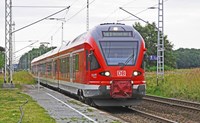
As part of the next long-term EU budget 2021-2027, the European Commission is today proposing to renew the 'Connecting Europe Facility', with a budget of €42.3 billion to support investments in the European infrastructure networks for transport (€30.6 billion), energy (€8.7 billion) and digital (€3 billion).
This represents a 47% increase compared to 2014-2020 (Comparison in current prices for EU-27 in 2014-2020 vs. EU-27 in 2021-2028. The increase is of 29% in constant prices of 2018.), showing the EU's commitment to a well-connected and integrated Union where citizens and businesses can fully benefit from free movement and the single market. For 2021-2027, the Commission is proposing to strengthen the environmental dimension of the Connecting Europe Facility, with a target of 60% of its budget contributing to climate objectives. This will help reinforce the Energy-Union, fulfil the EU's commitments under the Paris Agreement and consolidate Europe's global leadership in the fight against climate change.
Vice-President responsible for Energy Union, Maroš Šefčovič said: "Since the Paris Agreement, creating links between sectors is imperative. The new Connecting Europe Facility will push for even greater synergies between the transport, energy and digital sectors to maximise the impact of the energy transition. Moreover, its increased budget and possible blending with other instruments will help Europe stay ahead of the curve globally on innovative projects such as smart grids and energy storage."
Commissioner for Climate Action and Energy, Miguel Arias Cañete said: "This proposal will build the infrastructure needed for the clean energy transition and help achieve our ambitious 2030 climate and energy targets. The new programme will also help us complete strategic projects, such as the synchronisation of the Baltics with the European electricity grid, which are essential for a real Energy Union."
Commissioner for Transport, Violeta Bulc said: "Transport is an area where the EU brings concrete benefits to its people, and today we are proposing an unprecedented budget to improve mobility across our continent. We want Europeans to travel on the most modern, safe, clean, and connected network in the world. They deserve nothing less."
The Commission's proposal aims to better integrate the transport, energy and digital sectors, in order to accelerate the decarbonisation and digitalisation of the EU's economy. Clean mobility solutions – such as electric mobility – for instance require a close integration between the transport and energy sectors. Other examples include autonomous mobility, energy storage and smart grids.
About European Commission
 Transport directly affects everyone in Europe. Whatever age we are, and whatever activities we undertake, transport and mobility play a fundamental role in today’s world. The aim of the Commission is to promote a mobility that is efficient, safe, secure and environmentally friendly and to create the conditions for a competitive industry generating growth and jobs. The issues and challenges connected to this require action at European or even international level; no national government can address them successfully alone. The European Commission’s Directorate-General for Mobility and Transport works in concert with the European Union Member States, European industry, citizens and stakeholders.
Transport directly affects everyone in Europe. Whatever age we are, and whatever activities we undertake, transport and mobility play a fundamental role in today’s world. The aim of the Commission is to promote a mobility that is efficient, safe, secure and environmentally friendly and to create the conditions for a competitive industry generating growth and jobs. The issues and challenges connected to this require action at European or even international level; no national government can address them successfully alone. The European Commission’s Directorate-General for Mobility and Transport works in concert with the European Union Member States, European industry, citizens and stakeholders.




Comments
There are no comments yet for this item
Join the discussion